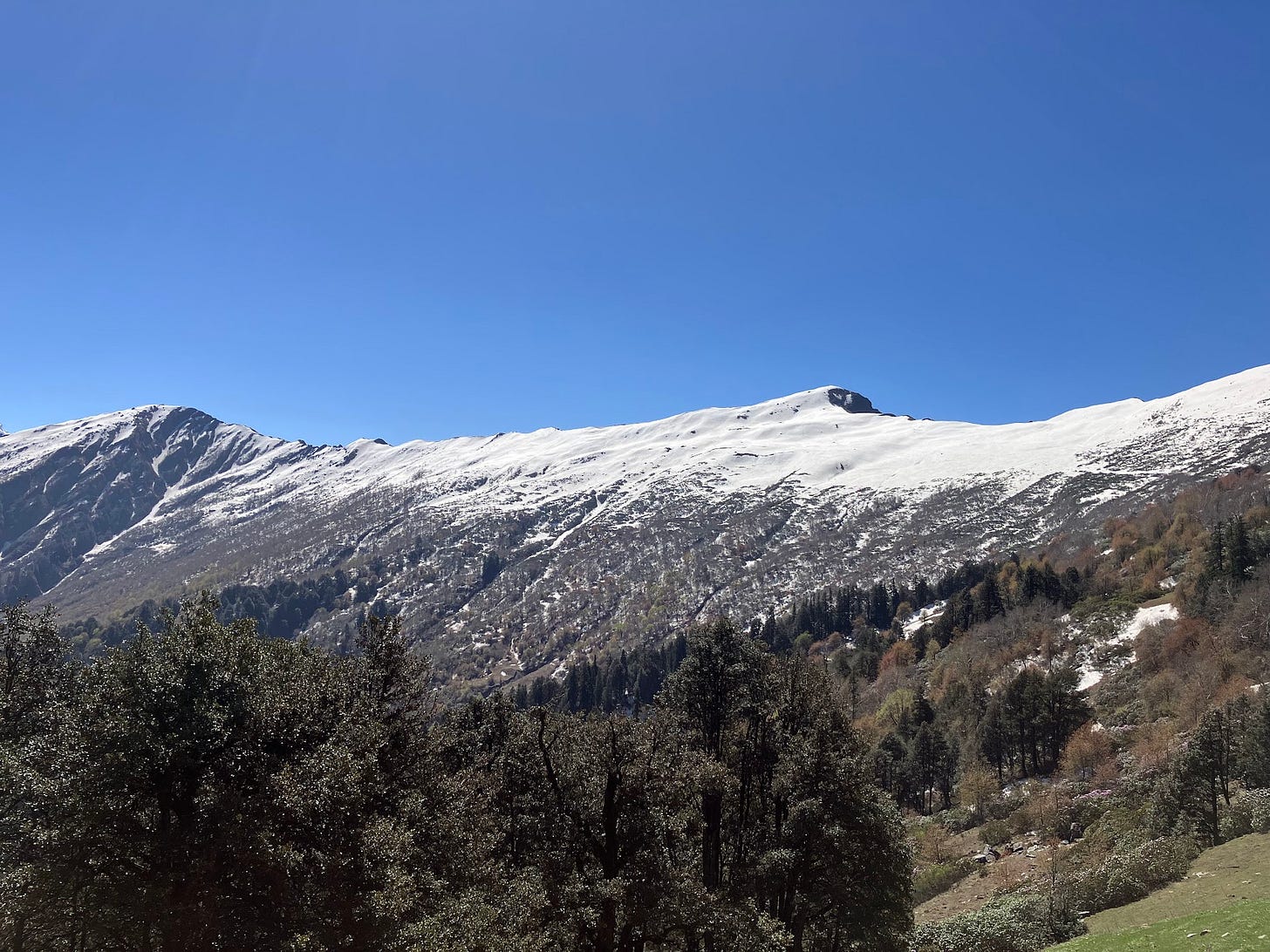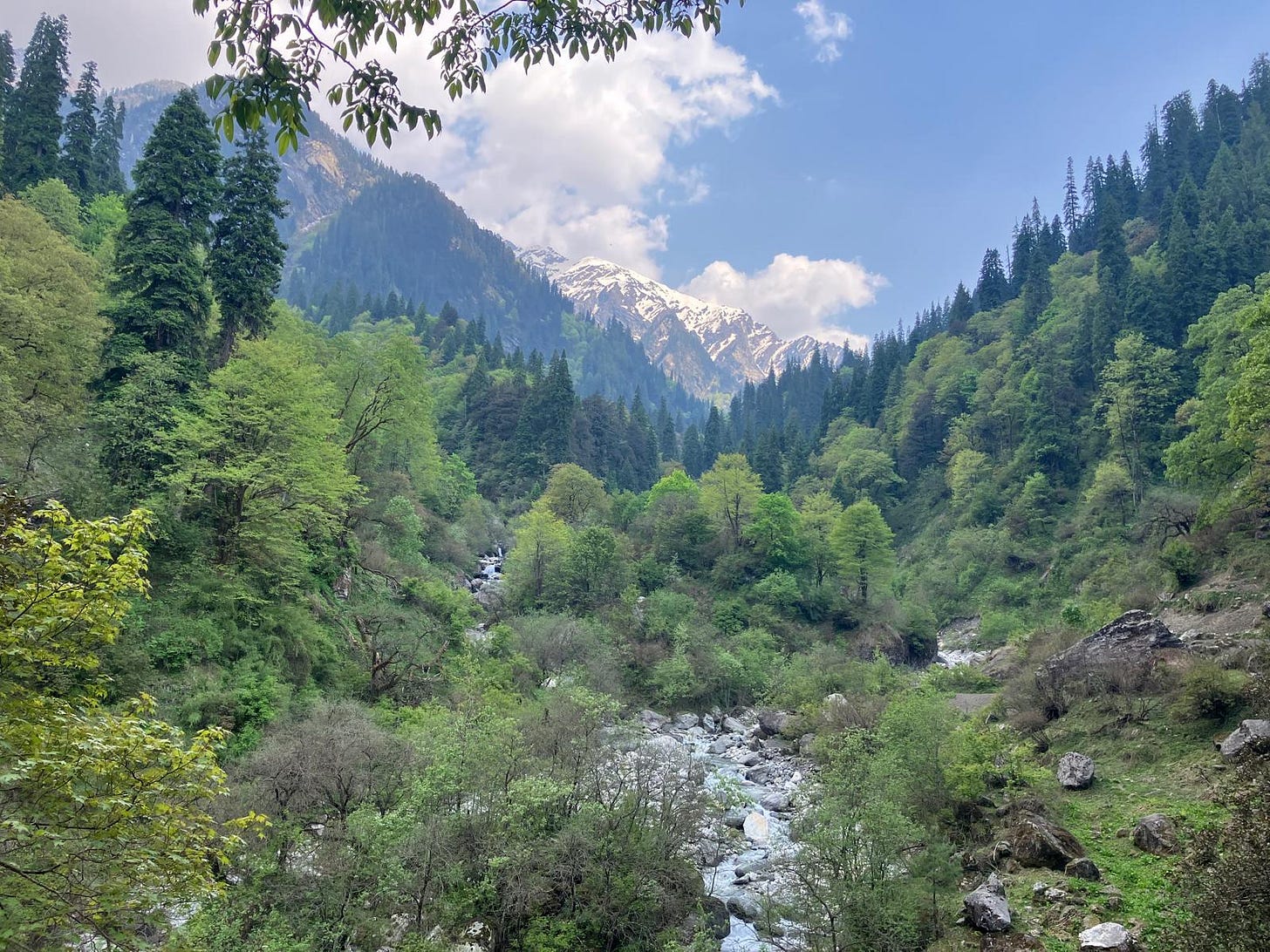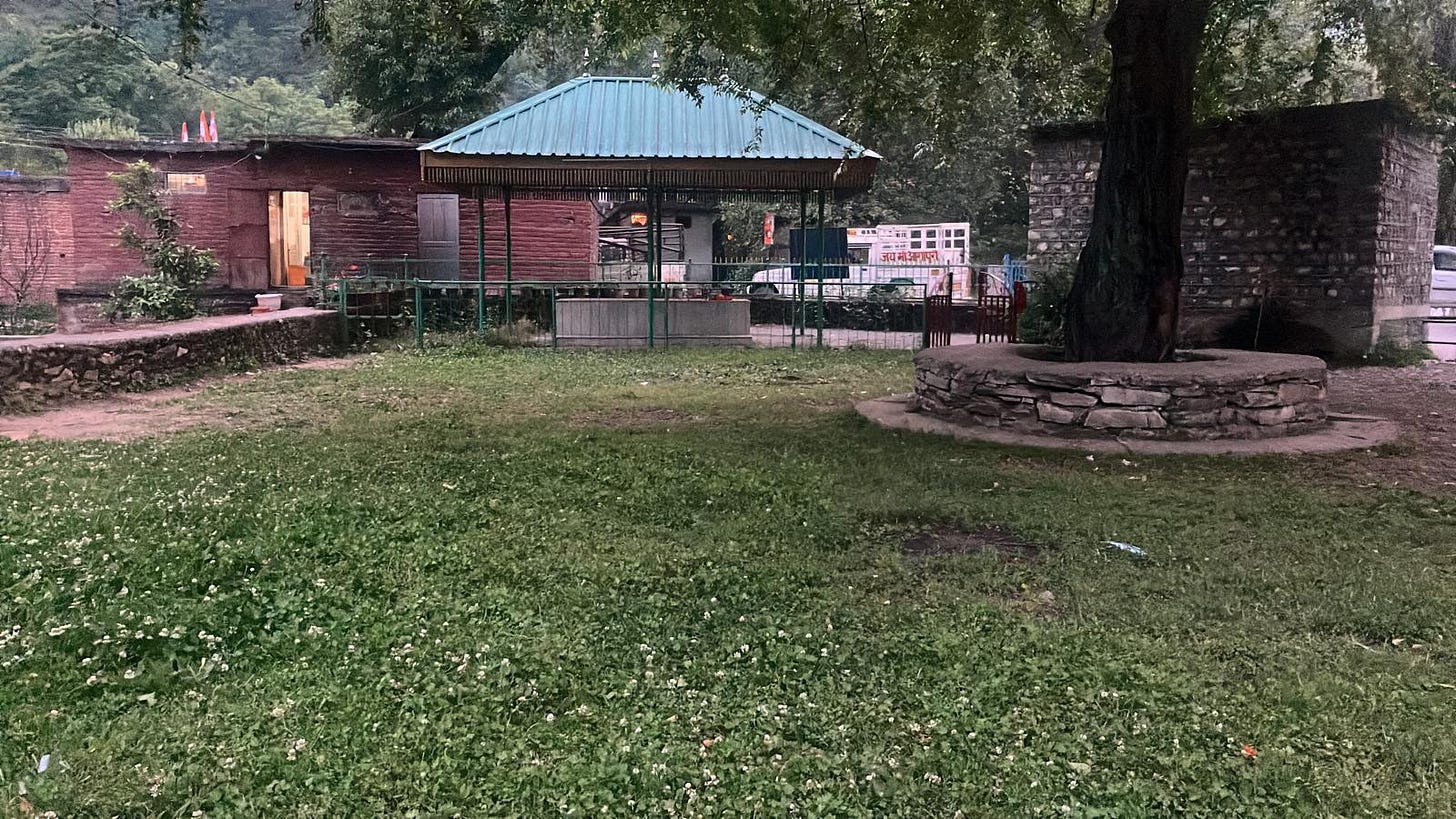Chapter 6
Listen to your Gut
If you want to make God laugh, tell him your plans, or so the old saying goes. I suppose the secular equivalent is telling the internet your plans, which I made the mistake of doing in Chapter 5. It's safe to say the 7 day solo hike I had planned didn't go to... plan.
It was the first day that I had been most nervous about, because this meant crossing the highest pass of the route: the Chandrakani (3650m). I had heard mixed reports from other hikers. Some warned it was too early to go (the pass has a large, north-facing approach which accumulates a lot of snow), and a contact in the base village of Rumsu said commercial trekking groups had been turned around by the conditions. I adopted my usual attitude: I would go up and see for myself, and if there was too much snow to safely cross, I would retreat and make a new plan.
I reached Rumsu on Sunday evening after stopping in the nearby town of Naggar for dinner, and packing some fried rice for breakfast. I slept in a simple homestay, and awoke at 6am to a beautiful, clear morning. The weather was undoubtedly on my side. I quickly ate, quietly packed and started hiking out of the sleepy village. The trail winds up through forests for a couple of miles before it clears into open meadows, where I started passing the fixed camps of large trekking groups. My anxiety about the pass was allayed by a conversation with one of the guides who told me he thought conditions on the pass would be manageable, but that they would be taking 3 more days to reach it. Increasingly confident, I pushed on, soon reaching the snowline and traversing across a steep slope towards the saddle, kicking each step into the firm snow. At points the snow was two feet deep, but it wasn't as bad as feared.
I was just a couple of hundred metres below the pass when I got the first inkling that something was wrong. It began as a dull ache in my stomach, which I did my best to ignore, but within a few minutes that became impossible. I was hit by a sudden wave of nausea, and seconds later I was bent double, vomiting into the snow. God dammit. It's hard to know for sure, but I think the culprit was the fried rice I'd eaten a few hours before, which my body was now desperate to expel.
As I was practically at the pass, I decided there was no use in turning around. It would be faster to push on and descend to the village of Malana in the next valley, but this proved easier said than done. I hoped that after the first bout of vomiting my condition would improve, but the relief was short-lived. Ten minutes later, while I was navigating the tricky arête below the summit, I once again violently emptied my stomach. This time it was accompanied by dizziness, and a feeling of deep fatigue, as if I was wading through treacle. My bag seemed to triple in weight. I was struck by the vulnerability of my situation. I was alone on top of a snow covered ridge, several hours walk from the nearest human being, and my condition, if anything, seemed to be deteriorating.
I stumbled on, meeting the trail on the now snow-free south-facing slopes, but my heart sunk as the route to Malana came into view. It followed a steep drainage, full of loose rocks and scree, the trail barely discernible between the rubble. Normally, this wouldn't be much cause for concern, but I was unsteady on my feet and I knew a fall here would turn my precarious situation into an outright dangerous one. I sat down on a rock, and took a quick mental inventory. The sky now had a few clouds, but none of them looked very threatening. It was early afternoon, so I had several hours of sunlight. I had a fully charged phone, a couple of bars of phone signal, and a power bank in my pack. I had run out of water, the last of which I'd used to rinse the painful stomach acid from the back of my throat. Okay Pete. Think.
The map showed a stream about 500m beneath me, so this became the next target. Reaching it was painfully slow, the dizziness causing me to stop every minute or so and lean over on my trekking poles, inhaling deeply. After what felt like an eternity I reached it and filled my bottle. I was dehydrated, with a slight headache starting to set in. I sat down in the grass, where I was immediately overwhelmed by exhaustion. I had no choice but to give into it, so I set an alarm on my phone for an hour's time, and fell into a blissful sleep, allowing myself to forget for a few moments that I was alone on the mountainside.
I awoke shivering despite the bright sunshine, and pulled on my down jacket before talking myself back into action. I still felt very dehydrated, so I finished the bottle and refilled it before continuing my crawl down towards Malana, but after a few minutes I was back on my hands and knees, throwing up the water I had just consumed. I started to feel scared. I wasn't in any immediate jeopardy, but I knew no one was coming to get me. I had to get myself down, and right now that seemed an almost impossible task. Thank God, I had phone signal. I called home, explaining the situation and my precise location to my parents. I told them I would call again once I reached the village, and that they should hear from me by evening.
The next hours passed in a blur of anxiety and frustration, each step taking an inordinate amount of effort and concentration. I could see the village a few hundred metres beneath me, but it got closer at an agonisingly slow rate. I finally reached Malana just before sundown, and went about finding somewhere to sleep. Malana is a strange village. Much has been written about its myth (here, for example), but one of its distinct features is that the villagers keep their distance from outsiders. For example, non-Malanis aren't permitted to enter a shop or hand money directly to a local, so buying a bottle of Coke (which I figured was my best chance to consume a few calories) involved shouting into the shop and leaving the money on the doorstep, on which they would leave the drink. A similar ritual was required to find and pay for a room, which I did before collapsing until the next morning.
When I awoke my stomach felt much more settled, but I had no appetite and no energy. I decided the best plan of action was hiking to the nearest road head (just a mile or so from the village), where I would find transport to Kasol, a small town in the neighbouring Parvati Valley. This would mean skipping about half a day of the route, but it would allow me to recover in the relative comfort of a town. After a shared taxi and a bus down the bumpy mountain roads, I reached Kasol by mid-afternoon, found a room, and spent most of the day sleeping, occasionally trying to snack on a banana or a few biscuits. The next morning brought much the same thing. I felt better, but still exhausted, and certainly not confident enough to leave civilisation behind for the next high, remote pass. So, it was one more day of lazing around Kasol, eating a few small meals in the hope my energy levels would return. I committed to leaving early the next morning.
When my alarm went off, I wanted nothing more than to stay in bed, to abandon the hike, and to return to a place of comfort and safety. It was the start of a mental struggle that would accompany me for the rest of the week. On the one hand, it's important to listen to your gut, as it's often the thing that keeps you safe, especially when it comes to decision making in the mountains. On the other hand, sometimes you have to silence your inner-critic, and just get shit done. Solo hiking can be difficult. It's one of the reasons people do it.
I think a part of me was still shaken by my experience on the Chandrakani, and my usual self-belief had abandoned me. I decided to hedge my bets. I would hike to Grahan village (the last bit of civilisation before the next pass), and defer my decision until then. If things didn't feel right, I could always turn around and come back to Kasol. The first few miles of trail are gentle, following a river through quiet green forests. My mood slowly improved, and I reached Grahan within a couple of hours, stopping at one of the homestays for a quick lunch. My appetite hadn't fully recovered, but I managed to eat something, and had the kitchen pack me dal and rotis for later. I decided to continue.
After Grahan, the hiking gets a good deal more serious. My aim was the meadows below the Khauli Pass, but between me and them were several miles of dense, difficult jungle. The trail remained clear for a mile or two past a series of large waterfalls, but then the forest begins. There were huge boulders to negotiate on the side of the river, and then an obstacle course of downed trees, where I'd regularly get a face full of spider's web as I clambered between them. It was slow, engaging, and difficult hiking, barely leaving me any time to ruminate on my doubts. This was black bear country, so I would regularly shout into the forest to warn them of my presence. After a couple of slow hours sweating through the dense undergrowth, I reached the treeline and was met by a very welcome sight: sheep.
Sheep means shepherds, and a few hundred meters away in the meadows to my right I could see the yellow tarpaulins of a camp. I don't know why, but the thought of having some company out here seemed incredibly appealing. I went over, and was greeted by an old shepherdess who immediately offered me tea, boiling water on the open fire. Shortly afterwards, three men arrived with their main flock of around 300 sheep, and we settled in for the evening. The youngest shepherd spoke some English, and we managed to combine my broken Hindi into a basic conversation. The eldest sat smoking charas and passed the joint round the circle. I retired to my tent, soon falling asleep to the gentle sound of the sheep quietly grazing.
The next morning was another clear day, the sun just starting to peer over the steep mountains that surrounded the valley. I soon left the meadows, and started climbing the gulley which would eventually lead to the pass. It was steep and difficult, lactic acid seeming to build in my legs after just a few steps. The now familiar internal struggle began. I know I didn't quite feel right. But I also felt a pang of guilt. Here I was, in this amazing place, doing exactly what I'd come here to do. And all I wanted to be was anywhere else. It was pathetic.
The rocky gulley soon gave way to snow, and the imperative to concentrate temporarily snapped me out of my malaise. I carefully kicked in steps to cross a steep slope, but I must have got impatient, because on one step my foot slipped and I slid 20ft, crashing into a pile of branches and painfully scraping the backs of my legs. I limped on, eventually reaching the pass, where I had to pause for a few minutes to mentally regroup.
The start of the descent was even worse - I think the trail that used to exist had been wiped out in the floods of last year, and so I began scrambling down the hillside. As I rounded a corner, I heard an unexpected sound. It was a pneumatic drill, as if from roadworks. The nearest road was miles beneath me, and I couldn't understand how the sound had carried so far, but the mystery was soon solved. Five or six men came into view. They had propped a log up against a steep cliff, on top of which two of them supported the third, who was drilling a hole directly into the rock face. They were equally surprised to see me. “What are you doing?” I enquired. “Crystals!” came the one word reply. One of them handed me a shiny lump of quartz, insisting I keep it. It turns out they had lugged a small generator and the drill up from Manihar, the village I was heading for. They said they would camp up here for several days at a time, and then would sell their loot to local jewellers. Our little interaction helped to cheer me, and I settled on the same mental game as the day before. Just get to Manihar, then you can quit.
I would occasionally pick up remnants of the old trail, but the route down to Manihar mostly involved following the Hurla Nala, a stream which got bigger as I descended. I spent hours hopping from boulder to boulder, down climbing sections of waterfall, and finding ways through the undergrowth. I stopped to soak my tired legs in an icy pool, before finally seeing a dirt road beneath me in the bottom of the valley. As soon as I reached it, a construction lorry passed (here to work on a local hydropower project), and I flagged it down. They agreed to take me a few miles down the valley to Garsa, which would be the start of tomorrow's pass, should I choose to continue. I spent the evening pitched up in the dhaba drinking tea and eating samosas, still slightly shell-shocked by the difficulty of the day. The Auntie agreed I could pitch my tent on a patch of grass behind the dhaba (which also served as a kind of village green), and I decided to wait until morning before planning my next move.
Garsa is a quiet, idyllic village, and at daybreak a man from one of the houses opposite came over to my tent to offer me tea. We sat together in his yard, and I couldn't help but feel comforted. I had a few reassuring bars of phone signal for the first time since Kasol, and the pass that lay ahead was lower, and substantially more straightforward than the previous day. Fuck it, I’ve got one more in me.
After a breakfast of omelette and roti in the dhaba, I started climbing out of the valley towards the Kandi Pass, which would take me into the Sainj Valley. The first stop was the village of Palgi, about an hour up the hill. It was a warm day, and I was sad to find the small village shop locked, but after asking a few Uncles who were sat nearby smoking, a woman appeared with a key to sell me a cold drink. While I rehydrated they peppered me with the usual questions (“Where are you from? Where are you going? How old are you? Are you married? Why not?”). I think it was because I'd decided today would be my final day, but I felt a real weight had been lifted. I was tired, my back ached, my legs were bruised and scratched from yesterday's efforts, but I was committed to trying to enjoy the final few hours. As I left the village and reentered the forests, I blasted a few serotonin-boosting tunes on my headphones, and chipped away the remaining miles to the pass. The descent winds down through countless farms and hamlets, towards the Sainj River, which I crossed on a rickety wooden footbridge at around 3pm, climbed up to the road, and after an hour or so of waiting, flagged down a local bus which would take me back towards the highway at Aut. The hike was over.
Running and hiking literature is littered with clichés about how the mental supersedes the physical (“Running is 90% mental, the other 10% is in your head”, etc.). Like most clichés, they contain a kernel of truth. I think more accurately, physical strength is a necessary, but not a sufficient condition for success. After the early sickness, my body mostly recovered, but I never quite regained the mental capacity to finish the route I had planned. A few days removed, I can't quite explain the failure. Over the years, despite a lack of talent or fitness, I've ground out difficult routes relying on a wellspring of stubbornness and youthful hubris. As my youth recedes, I've (hopefully) abandoned some of the less desirable trappings of adolescence. But part of my capacity for self-belief has receded too. Sometimes, you need blind faith. This time I just didn't have it.










As a physician of 25 years and an avid trekker for 35 years, I've seen my share of illnesses, injuries, AMS, and evacuations from the mountains. A good rule of thumb is to stop and turn around if you're sick or the weather is bad, but that's not always possible when you're more than a day's trek from the nearest town or road. Medicines
- sublingual Vomikind tablets that dissolve under you tongue to stop vomiting, ORS, and antibiotics like azithromycin are always in my 1st aid kit. Plus typhoid vaccination every 2 years and influenza vaccination annually. Most important - good sanitation, including being picky about where and what you eat!